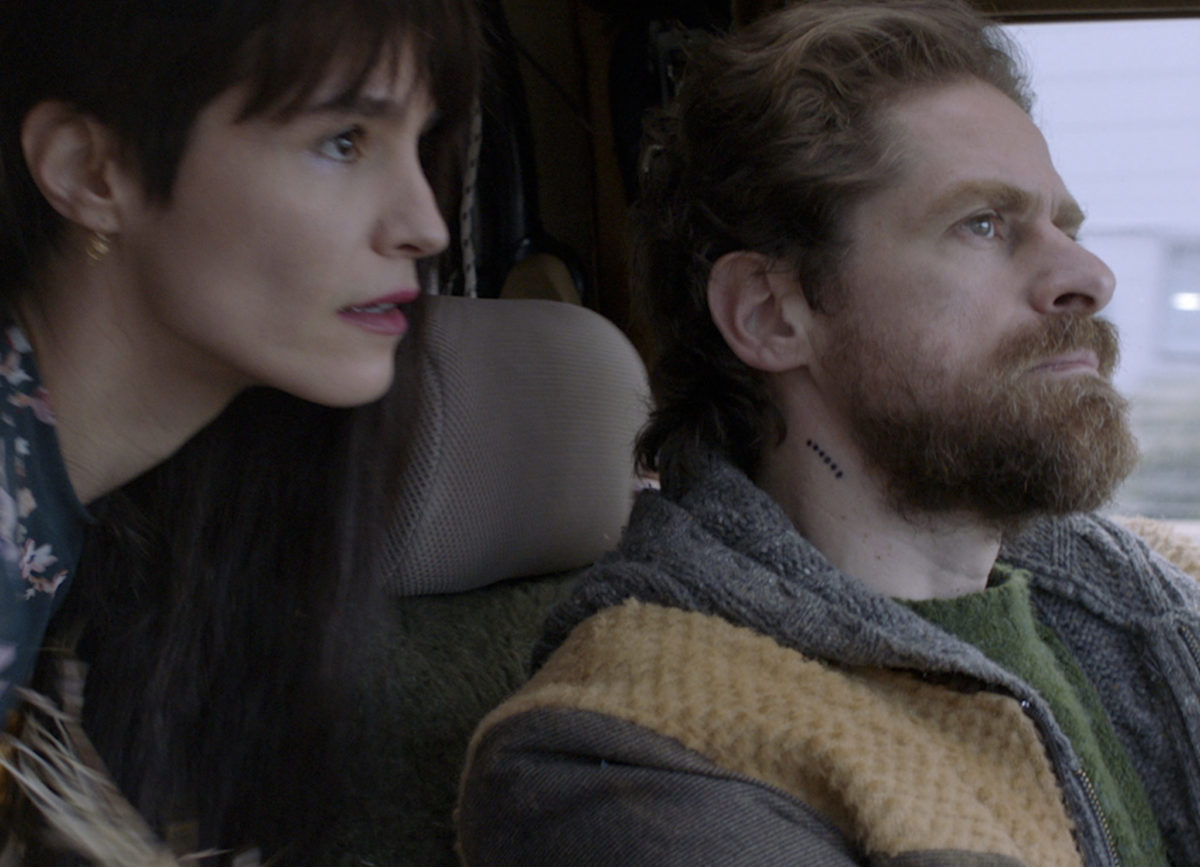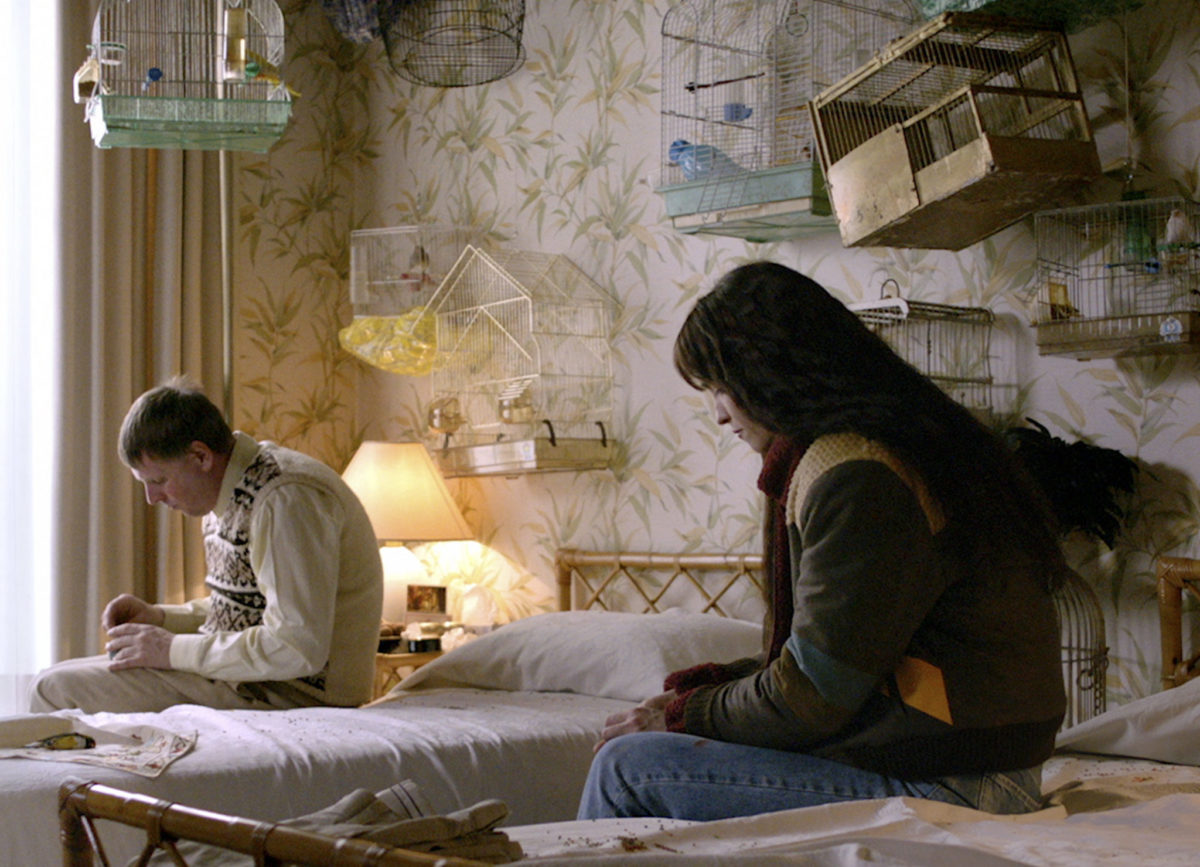Penelope and Dimitris are professional pet cremators. They roam the sprawling periphery of an industrial Greek town, retrieve defunct animals from their owners, burn them, and return their ashes. There’s a sense of urgency to their mission: kala azar, the infectious disease Janis Rafa’s singular debut feature is named after, is decimating hordes of canines all across Southern Europe, and the epidemic is threatening humans, too. But the couple’s pilgrimage also crackles with a certain compassion, an empathy that blurs their distance from the carcasses and complicates their role as undertakers. “You can include some of your pet’s favorite things,” Penelope tells a grieving woman before folding a handkerchief over her dead goldfish, rehearsing new condolences on her way to the next mourner: “We understand this must be a difficult time for you and your family…”
Truth be told, Rafa’s taciturn leads should only be concerned with pets proper: the little cash the municipality will pay for their services only covers the ashes of creatures formerly owned by humans for strict companionship purposes. But when their Jeep passes by discarded roadkill, the two can’t help but pick up the lifeless bodies and give them an illegal cremation in the dead of night. In Rafa’s disquieting, moribund universe–a wasteland of industrial debris and derelict houses frozen in a 1990s impasse–what kind of grieving animals can aspire to depends on the role they serve for the humans around them. And it’s upon that hierarchy of worthy and unworthy creatures, of sanctioned and illegal mourning, that this odd and confounding tale of human-animal relations draws some of its most interesting material.

A video artist with exhibitions at the Tate Modern and Viennale, among others, writer-director Rafa conjures a free-form tale drenched in bleak Greek New Wave surrealism. Three different storylines unfold along separate tracks, crossing one another only at evanescent junctures: there’s thirty-something Penelope and Dimitris (Penelope Tsilika and Dimitris Lalos) going about their Charon-like journey, Penelope’s parents (the father played by Rafa’s own, Tasos Rafailidis), living in close quarters with a pack of dogs of their own, and the migrant workers toiling in rundown chicken hatcheries, men who hover around the city’s outskirts like silent ghost-like observers.
The plot, such as it is, is rather thin (more a collection of episodic vignettes than a three-act scaffolding) with Rafa zigzagging across her pantheon of characters, human or otherwise. But Kala Azar remains Penelope and Dimitris’ film. It’s on their bodies that the boundary between humans and animals is made more permeable, their skins that serve as battlegrounds where wounds and cuts are inflicted, and the integrity of the human body undermined. After all, there’s something curiously animalistic about the two: in Rafa’s verbally parsimonious script, man and woman communicate by and large via mute gestures, nods and grunts that echo those of the animals agonizing around them.
Visually and aurally, the film strives to replace an anthropocentric gaze with something closer to a canine grammar. And the results are unsettling as they are captivating. Cinematographer Thodoros Mihopoulous leaves the camera hanging at dog’s eye level, a strategy that harkens back to another recent canine tale, Elsa Kremser and Levin Peter’s hypnotic documentary Space Dogs (2019). In turn, Marc Lizier’s sound design adds another alienating layer, drowning the couple’s silences with muffled barking and sniffing that fill the frame as omnipresent white noise.

What emerges from Kala Azar is not a chronicle of a couple’s metamorphosis as much as a portrait of an unsettling symbiosis. Rafa does not, in any simplistic sense, posit Penelope and Dimitris’ laconic journey as a transformation from humans to animals. Nor does the film ever align that shift to a form of barbarization. Instead, with its brusque and recurrent crisscrossing from animal to human bodies (thrusting us from close-ups of paws to Penelope and Dimitris’ legs locked in an orgasm), Kala Azar understands the border between the two universes as fundamentally porous, and that alleged dualism as a form of cohabitation.
Heightening that blurring, Tsilika and Lalos offer raw performances that add a sense of survivalist despair to the drama. A gritty, hermetic picture, if Kala Azar can often feel so unnerving, that’s because by bridging the gap between its two ostensibly incongruous universes, it makes the desolating fate of those unworthy carcasses ring uncomfortably close to ours. It’s a call for empathy reverberating in a world that’s slowly, inexorably falling apart. And there’s so much surreal beauty in that collapse.
Kala Azar premiered at the International Rotterdam Film Festival.

